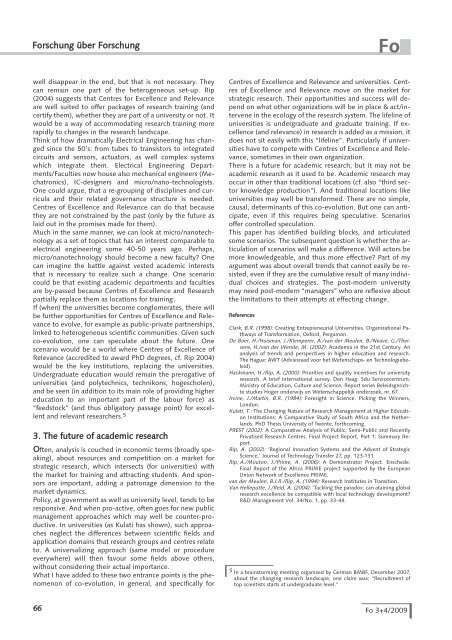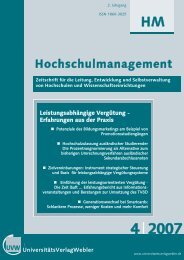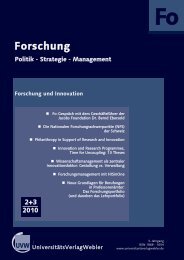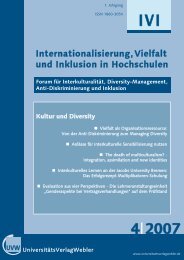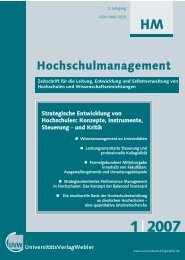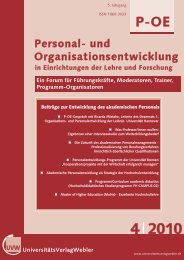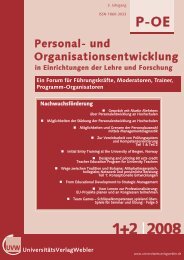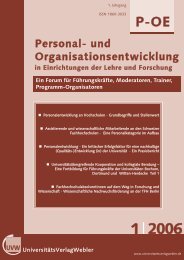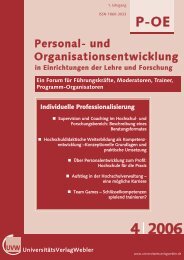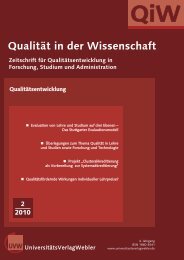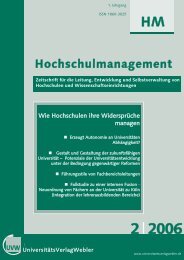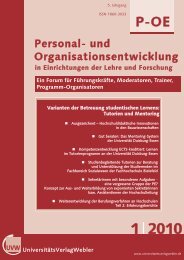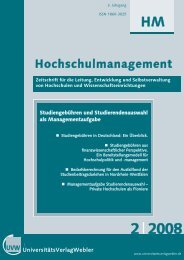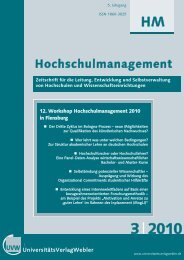Fo - UniversitätsVerlagWebler
Fo - UniversitätsVerlagWebler
Fo - UniversitätsVerlagWebler
Sie wollen auch ein ePaper? Erhöhen Sie die Reichweite Ihrer Titel.
YUMPU macht aus Druck-PDFs automatisch weboptimierte ePaper, die Google liebt.
<strong>Fo</strong>rschung über <strong>Fo</strong>rschung<br />
<strong>Fo</strong><br />
well disappear in the end, but that is not necessary. They<br />
can remain one part of the heterogeneous set-up. Rip<br />
(2004) suggests that Centres for Excellence and Relevance<br />
are well suited to offer packages of research training (and<br />
certify them), whether they are part of a university or not. It<br />
would be a way of accommodating research training more<br />
rapidly to changes in the research landscape.<br />
Think of how dramatically Electrical Engineering has changed<br />
since the 50’s: from tubes to transistors to integrated<br />
circuits and sensors, actuators, as well complex systems<br />
which integrate them. Electrical Engineering Departments/Faculties<br />
now house also mechanical engineers (Mechatronics),<br />
IC-designers and micro/nano-technologists.<br />
One could argue, that a re-grouping of disciplines and curricula<br />
and their related governance structure is needed.<br />
Centres of Excellence and Relevance can do that because<br />
they are not constrained by the past (only by the future as<br />
laid out in the promises made for them).<br />
Much in the same manner, we can look at micro/nanotechnology<br />
as a set of topics that has an interest comparable to<br />
electrical engineering some 40-50 years ago. Perhaps,<br />
micro/nanotechnology should become a new faculty? One<br />
can imagine the battle against vested academic interests<br />
that is necessary to realize such a change. One scenario<br />
could be that existing academic departments and faculties<br />
are by-passed because Centres of Excellence and Research<br />
partially replace them as locations for training.<br />
If (when) the universities become conglomerates, there will<br />
be further opportunities for Centres of Excellence and Relevance<br />
to evolve, for example as public-private partnerships,<br />
linked to heterogeneous scientific communities. Given such<br />
co-evolution, one can speculate about the future. One<br />
scenario would be a world where Centres of Excellence of<br />
Relevance (accredited to award PhD degrees, cf. Rip 2004)<br />
would be the key institutions, replacing the universities.<br />
Undergraduate education would remain the prerogative of<br />
universities (and polytechnics, technikons, hogescholen),<br />
and be seen (in addition to its main role of providing higher<br />
education to an important part of the labour force) as<br />
“feedstock” (and thus obligatory passage point) for excellent<br />
and relevant researchers. 5<br />
3. The future of academic research<br />
Often, analysis is couched in economic terms (broadly speaking),<br />
about resources and competition on a market for<br />
strategic research, which intersects (for universities) with<br />
the market for training and attracting students. And sponsors<br />
are important, adding a patronage dimension to the<br />
market dynamics.<br />
Policy, at government as well as university level, tends to be<br />
responsive. And when pro-active, often goes for new public<br />
management approaches which may well be counter-productive.<br />
In universities (as Kulati has shown), such approaches<br />
neglect the differences between scientific fields and<br />
application domains that research groups and centres relate<br />
to. A universalizing approach (same model or procedure<br />
everywhere) will then favour some fields above others,<br />
without considering their actual importance.<br />
What I have added to these two entrance points is the phenomenon<br />
of co-evolution, in general, and specifically for<br />
Centres of Excellence and Relevance and universities. Centres<br />
of Excellence and Relevance move on the market for<br />
strategic research. Their opportunities and success will depend<br />
on what other organizations will be in place & act/intervene<br />
in the ecology of the research system. The lifeline of<br />
universities is undergraduate and graduate training. If excellence<br />
(and relevance) in research is added as a mission, it<br />
does not sit easily with this “lifeline”. Particularly if universities<br />
have to compete with Centres of Excellence and Relevance,<br />
sometimes in their own organization.<br />
There is a future for academic research, but it may not be<br />
academic research as it used to be. Academic research may<br />
occur in other than traditional locations (cf. also “third sector<br />
knowledge production”). And traditional locations like<br />
universities may well be transformed. There are no simple,<br />
causal, determinants of this co-evolution. But one can anticipate,<br />
even if this requires being speculative. Scenarios<br />
offer controlled speculation.<br />
This paper has identified building blocks, and articulated<br />
some scenarios. The subsequent question is whether the articulation<br />
of scenarios will make a difference. Will actors be<br />
more knowledgeable, and thus more effective? Part of my<br />
argument was about overall trends that cannot easily be resisted,<br />
even if they are the cumulative result of many individual<br />
choices and strategies. The post-modern university<br />
may need post-modern “managers” who are reflexive about<br />
the limitations to their attempts at effecting change.<br />
References<br />
Clark, B.R. (1998): Creating Entrepreneurial Universities. Organizational Pathways<br />
of Transformation, Oxford, Pergamon.<br />
De Boer, H./Huisman, J./Klemperer, A./van der Meulen, B./Neave, G./Theisens,<br />
H./van der Wende, M. (2002): Academia in the 21st Century. An<br />
analysis of trends and perspectives in higher education and research.<br />
The Hague: AWT (Adviesraad voor het Wetenschaps- en Technologiebeleid).<br />
Hackmann, H./Rip, A. (2000): Priorities and quality incentives for university<br />
research. A brief international survey. Den Haag: Sdu Servicecentrum,<br />
Ministry of Education, Culture and Science, Report series Beleidsgerichte<br />
studies Hoger onderwijs en Wetenschappelijk onderzoek, nr. 67.<br />
Irvine, J./Martin, B.R. (1984): <strong>Fo</strong>resight in Science. Picking the Winners,<br />
London.<br />
Kulati, T.: The Changing Nature of Research Management at Higher Education<br />
Institutions: A Comparative Study of South Africa and the Netherlands.<br />
PhD Thesis University of Twente, forthcoming.<br />
PREST (2002): A Comparative Analysis of Public, Semi-Public and Recently<br />
Privatised Research Centres. Final Project Report, Part 1: Summary Report.<br />
Rip, A. (2002): ‘Regional Innovation Systems and the Advent of Strategic<br />
Science,’ Journal of Technology Transfer 27, pp. 123-131.<br />
Rip, A./Mouton, J./Prime, A. (2006): A Demonstrator Project. Enschede.<br />
Final Report of the Africa PRIME project supported by the European<br />
Union Network of Excellence PRIME.<br />
van der Meulen, B.J.R./Rip, A. (1994): Research Institutes in Transition.<br />
Van Helleputte, J./Reid, A. (2004): ‘Tackling the paradox: can ataining global<br />
research excellence be compatible with local technology development?<br />
R&D Management Vol. 34/No. 1, pp. 33-44.<br />
5 In a brainstorming meeting organized by German BMBF, December 2007,<br />
about the changing research landscape, one claim was: “Recruitment of<br />
top scientists starts at undergraduate level.”<br />
66 <strong>Fo</strong> 3+4/2009


